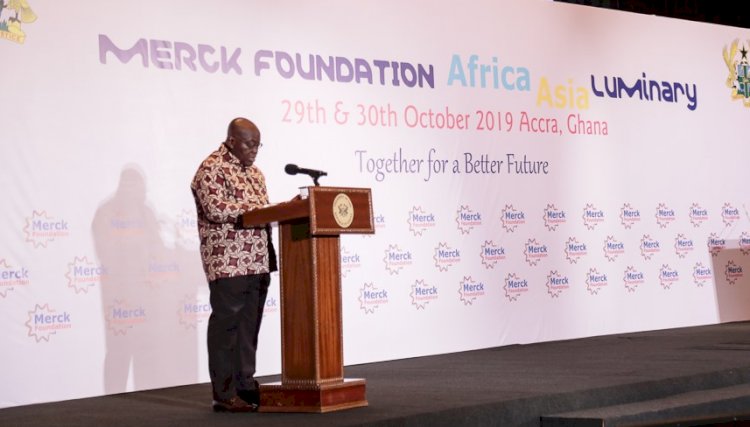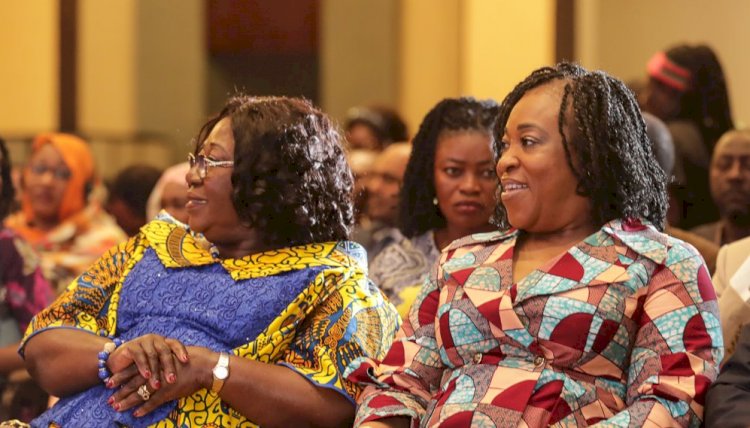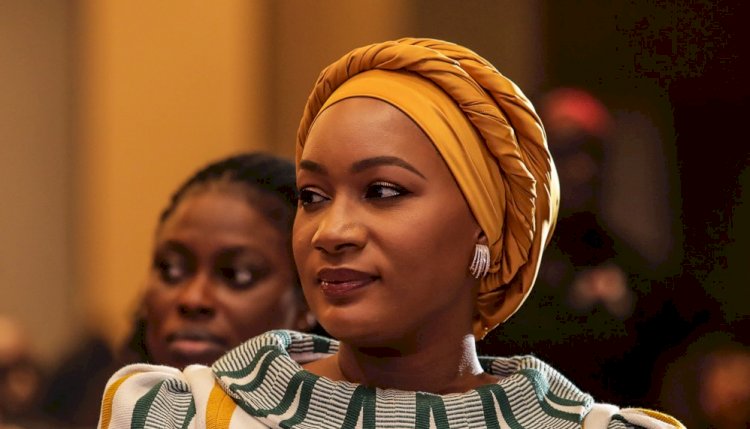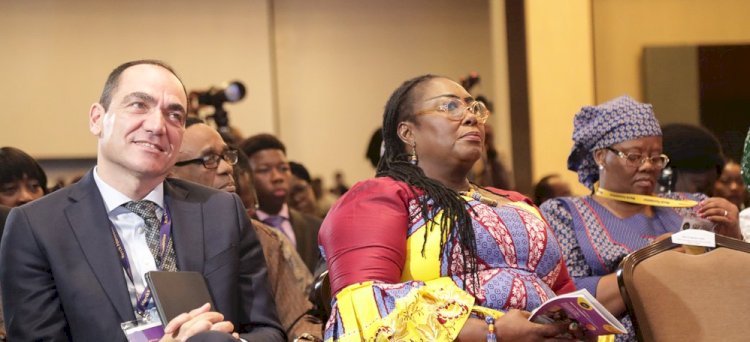President Akufo-Addo appeals to African first Ladies and practitioners to Work together against the Stigmatisation Of Infertility
He made the call on Tuesday at the 6th Edition of the Merck Africa Asia Luminary, Accra

The President of the Republic, Nana Addo Dankwa Akufo-Addo, has appealed to First Ladies of fellow African countries, policy makers and healthcare practitioners to join hands and win the battle against the stigmatisation of females with infertility.
With the World Health Organisation indicating that 186 million around the world suffering from either primary or secondary infertility, and with 50% of cases of a couple’s inability to conceive caused by infertility in men, the President stated that the economic, psychological and social-cultural burdens “fall disproportionately on women”.
Speaking on Tuesday, 29th October, 2019, at the 6th Edition of the Merck Africa Asia Luminary, held at the Kempinksi Hotel, Accra, the President stated that “from being abandoned, depressed, humiliated, insulted, maltreated and stigmatised, women suffer the most”.

It is estimated in Cote d’Ivoire, for example, that 26% of infertile women, compared with 3% of fertile women, have never been married. In Ethiopia, it is said that 85% of childless marriages end in divorce in 5 years. In Tanzania, “a childless widow may not inherit her husband’s wealth”. In South Africa, a survey conducted revealed higher levels of anxiety, depression and anger amongst infertile women.
In Ghana, President Akufo-Addo stated that “a woman who is infertile risks being treated as an outcast, and having her marriage ending. These cases, I believe, are not peculiar to these countries only, but are also representative of the unfortunate situation prevailing on the continent. It must end.”
The factors that lead to infertility, whether anatomical, endocrinological, genetic or immunological, he said, are not ones women wish on themselves.

“Yes, there may be other factors, such as infections to the reproductive system and poor health practices, which are preventable and may result in infertility. However, the onus is on each and every one of us to work hard towards finding solutions to addressing infertility and ending stigmatization”, he added.
As a matter of necessity, the President urged participants at the conference to “take urgent steps to incorporate issues regarding infertility prevention and its treatment in the development of maternal and reproductive healthcare policies of our respective countries.”
He continued, “We need to train more gynaecologists and embryologists, and we must, most certainly, make assisted reproductive technology, often referred to as in vitro fertilization (IVF), affordable and more available to the majority of women on the continent, who are faced with infertility.”

Ghana’s NCD Policy
Whilst working towards confronting issues of infertility in Ghana, President Akufo-Addo indicated that Ghana is also raising awareness on disease prevention, and improving access to quality and equitable health solutions, in conformity with the country’s Consolidated Programme of Economic and Social Development Policies (2017-2024), the nation’s blue print for its medium-term development.
“We are focusing on the prevention and treatment of non-communicable diseases (NCDs), such as hypertension, diabetes, sickle cell disease, asthma and cancer, which are estimated to account for more deaths than those occasioned by communicable diseases in Ghana,” he added.
The objectives of Ghana’s non-communicable diseases policy are to reduce exposure to risk factors that contribute to NCDs; to strengthen early detection and management to reduce morbidity and mortality from NCDs; to strengthen multi-sectoral collaboration for NCD Prevention and Control; and to ensure sustainable funding and other resources for NCDs.
READ ALSO:
Russia-Ghana Relations Must Be Based On Trade & Investment Co-Operation” – President Akufo-Addo
“Indeed, Ghana plans to achieve, by 2030, Universal Health Coverage (UHC), which we define, in the Ghanaian context, as follows: ‘All people in Ghana have timely access to high quality health services irrespective of ability to pay at the point of use’”, the President added.
He cited the example of the work being done with the Novartis Foundation, where ICT innovation is being piloted in the management of hypertensive patients.
“Through the use of ICT, patients receive SMS messages on treatment and adherence support, refill reminders, and healthy lifestyle messages on their cell phones. These have resulted in significant reductions in systolic and diastolic blood pressure after 6 months follow-up,” President Akufo-Addo said.

Reiterating the commitment of the country to working with institutions such as the Merck Foundation, President Akufo-Addo urged the gathering to focus also on subject of male infertility.
“They say it takes two to tango. We owe it to ourselves to create an Africa that focuses her energies on bringing progress and prosperity to the masses of her peoples. Let us, collectively, do our part in leading this march for the development of Africa. It is an exciting time for us in Africa,” he added.





































